
LACNIC is the regional Internet registry for the Latin American and Caribbean regions.

The Inter-American Development Bank is an international financial institution headquartered in Washington, D.C., United States of America, and serving as the largest source of development financing for Latin America and the Caribbean. Established in 1959, the IDB supports Latin American and Caribbean economic development, social development and regional integration by lending to governments and government agencies, including State corporations.

The Bolivarian missions are a series of over thirty social programs implemented under the administration of former Venezuelan president Hugo Chávez and continued by Chávez's successor, Nicolás Maduro. The programs focus on helping the most disadvantaged social sectors and guaranteeing essential rights such as health, education and food. The created missions created include Mission Robinson (literacy), Mission Barrio Adentro, and Mission Mercal.
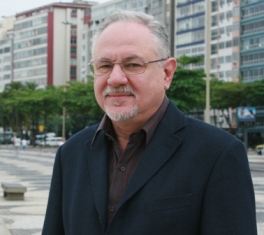
Bernardo Sorj is a Brazilian social scientist, retired professor of Sociology at the Federal University of Rio de Janeiro. He is Director of The Edelstein Center for Social Research and of the Plataforma Democrática Project. He has published 30 books and more than 100 articles, on Latin American political development, international relations, the social impact of new technologies, social theory and Judaism.
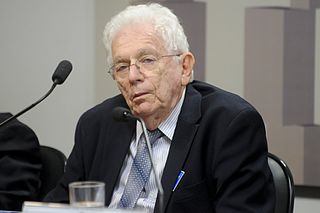
Simon Schwartzman is a Brazilian social scientist. He has published extensively, with many books, book chapters and academic articles in the areas of comparative politics, sociology of science, social policy, and education, with emphasis on Brazil and Latin America. He was the President of the Brazilian Institute for Geography and Statistics (IBGE) and is a retired professor from the Federal University of Minas Gerais. He is member of the Brazilian Academy of Sciences, holder of the Grand Cross of the Brazilian Order of Scientific Merit (1996). He is currently associate researcher at the Institute for Studies in Economic Policy Instituto de Estudos de Política Econômica / Casa das Garças - Rio de Janeiro.
André Medici is a Brazilian health economist with a background in health strategy, public and private health financing in Latin America and the Caribbean, social security and pensions, economic reform, gender health issues, environmental protection, and globalization. He is currently a Senior Health Specialist at the Inter-American Development Bank, in Washington, DC.
Poverty in South America is prevalent in most of its countries. Those that have the highest rates of poverty per population are Suriname, Bolivia and Venezuela. Recent political shifts in the region have led to improvements in some of these countries. In general, most South American economies have attempted to tackle poverty with stronger economic regulations, foreign direct investments and implementation of microeconomic policies to reduce poverty.
Graciela Limón is a Latina/Chicana novelist and a former university professor. She has been honored with an American Book Award and the Luis Leal Award for Distinction in Chicano/Latino Literature.
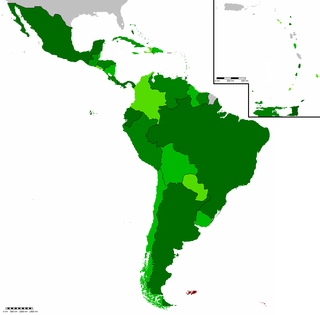
The Community of Latin American and Caribbean States (CELAC) is a regional bloc of Latin American and Caribbean states proposed on February 23, 2010, at the Rio Group–Caribbean Community Unity Summit, and created on December 3, 2011, in Caracas, Venezuela, with the signature of The Declaration of Caracas. It consists of 33 countries in Latin America and the Caribbean having five official languages.
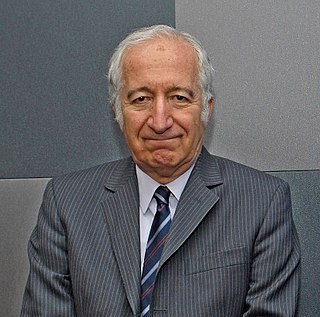
Bernardo Kliksberg is an Argentine Doctor of Economics, recognized around the world as the founder of a new discipline, social management, and a pioneer of development ethics, social capital and corporate social responsibility. His books, papers, advisory work, and research, applies an interdisciplinary approach integrating contributions of different social sciences.
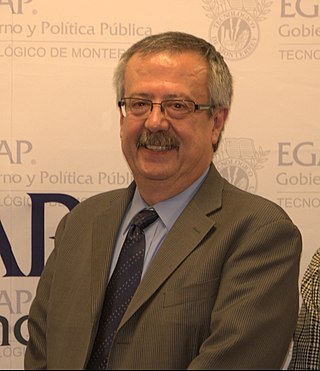
Carlos Manuel Urzúa Macías is a Mexican Professor of Economics at the Tecnológico de Monterrey, Mexico City and Santa Fe campuses. He is a National Researcher and a member of the Mexican Academy of Science. He served as the Secretary of Finance for the Mexico City government from 2000 to 2003. He is also an award-winning poet.

Elaine King Fuentes is a financial planner, writer and motivational speaker born in Lima, Perú. She lives in Miami. Fuentes has focused her career in financial education for families. In 2017, King was included in the list of the 25 most powerful Latina women in the United States, published by People magazine, and in 2020 and 2023, she appeared on Investopedia's Top 100 Financial Advisors list.

Centro de Estudios Públicos (CEP) is a non-profit Chilean think tank founded in 1980. Its stated mission is to “contribute to the development of a free and democratic society” through: 1) the analysis and dissemination of philosophical, political, social and economic problems of interest to Chilean society; 2) the study, discussion and design of public policies; and 3) the promotion of institutions that support and enable the existence of a constitutional and democratic order. CEP contributes to the public debate through its seminars, the policy brief Puntos de Referencia, the journal, Estudios Públicos which has appeared continuously since 1980, the publication of books and various research studies, as well as social surveys, which have been conducted since 1987. CEP has become a household name for political, academic, and intellectual debate.
Sonia Álvarez Leguizamón is an Argentine sociologist and anthropologist. She earned a bachelor's degree in social work from the Catholic University of Santa Maria, and a master's degree in Development Sociology from the National University of Cordoba. She earned her Ph.D. at the University of Seville in Social and Cultural Anthropology. Alvarez Leguizamón was the University of Salta as the Dean of the Faculty of Humanities and as the Director of the Masters programme in Social Policy. Alvarez Leguizamón has also worked extensively with Comparative Research Programme on Poverty (CROP) for the last fifteen years on issues relating to their organization and to El Consejo Latinoamericano de Ciencias Sociales (CLASCO). Along with writing her own research, Alvarez Leguizamón has also served as an editor for the second edition of CROP's Glossary of Poverty.
Silvia Berger works at the Ministry of Economics and Production in Argentina, Latin American Council of Social Sciences (CLACSO), and is a post-graduate university teacher at the Latin American Social Sciences Institute. and past president of the International Association for Feminist Economics (IAFFE), her tenure was from 2017 to 2018. 7 Berger is a member of the editorial committee for the Mexican journal Ola Financiera.

Eduardo Engel is the former president and current board member of the think tank Espacio Público and professor at the Department of Economics of the University of Chile. From 2001 to 2012 he was Professor of Economics at the Yale University. He chaired the Presidential Advisory Council on Conflicts of Interest, Influence Peddling, and Corruption – also known as the Engel Commission – in 2015.
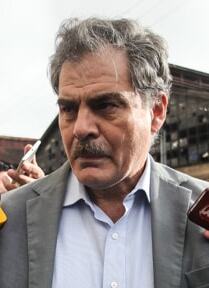
Juan Alberto Fuentes Knight is a Guatemalan economist, politician, and non-profit official. Among other roles, he has served as Minister of Finance in Guatemala and as chairman of Oxfam International.

Lea Raquel Giménez Duarte is a Paraguayan economist and the former finance minister of Paraguay. She was the first woman to hold the position and the youngest person to ever hold the position of finance minister in Latin America.
Emilio Luis Sempris Ceballos is a Panamanian politician and sustainability advocate. He served as Panama's minister of environment from 2017 to 2019. He also served as director general of the Water Center for the Humid Tropics of Latin America and the Caribbean (CATHALAC) between 2002 and 2012. In 2021, he was appointed as Distinguished Advisor of the Integrity Council for the Voluntary Carbon Market (ICVCM).

Emiliana Vegas is a U.S.-based policy analyst, academic, and author. She is a Professor of practice at the Graduate School of Education, Harvard University.













